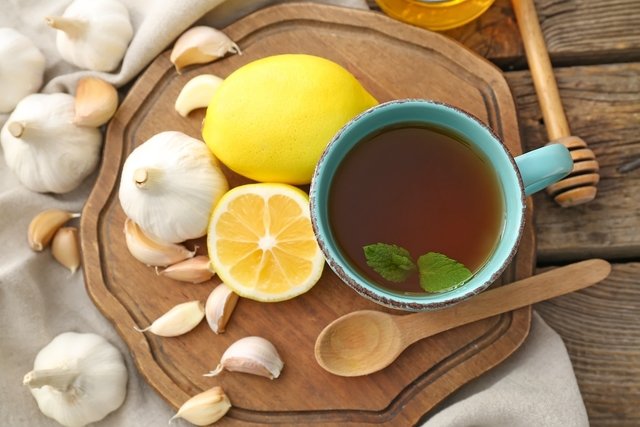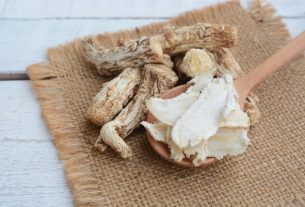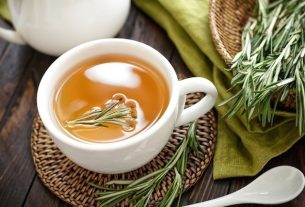Garlic tea can be used to combat coughs, flu and colds, as well as helping to strengthen the immune system, reduce bad cholesterol and control high blood pressure, as it has antioxidant, antiviral and immunomodulatory properties.
Furthermore, this tea can also help you lose weight, as it has thermogenic action, which helps to increase body temperature and accelerate metabolism, facilitating fat burning.
Garlic tea must be made with crushed garlic so that alliinase transforms alliin into allicin, which is the main substance that has medicinal properties. Furthermore, to improve the properties of the tea, you can add lemon, honey or ginger, for example.

What is it for
Garlic tea is recommended for:
1. Fight flu and colds
Garlic tea is rich in allicin, a sulfur compound, with immune system strengthening properties, which helps fight flu and colds, reducing their duration.
2. Strengthen the immune system
In addition to allicin, garlic tea has vitamin C in its composition, with antioxidant action, which together help to strengthen the immune system and fight viruses, bacteria and fungi.
3. Fight cough
Garlic tea has expectorant properties, which help fight coughs, as it makes phlegm more liquid, making it easier to eliminate.
Additionally, garlic tea has anti-inflammatory properties that help reduce lung inflammation. Check out other homemade ways to combat coughs.
4. Control high blood pressure
Garlic tea can help control mild to moderate high blood pressure, as it has a vasodilatory effect, that is, it increases the dilation of blood vessels, facilitating the flow of blood in the body, which lowers blood pressure.
5. Lower cholesterol
Garlic tea has an antioxidant and hypolipidemic action, which helps to lower bad cholesterol (LDL) and triglycerides, by inhibiting their oxidation, and in this way, prevents fatty plaques from forming in the arteries. See other natural ways to lower cholesterol.
6. Prevent cardiovascular diseases
The allicin present in garlic tea has a powerful antioxidant action, which helps reduce bad cholesterol and triglycerides that are responsible for forming fatty plaques in the arteries.
Furthermore, garlic tea helps reduce blood pressure and inhibit platelet aggregation, preventing the formation of clots within blood vessels.
Thus, this tea can reduce the risk of cardiovascular diseases, such as atherosclerosis, heart attack or stroke.
7. Promote weight loss
The allicin present in garlic tea can also help with weight loss, as it has thermogenic properties, accelerating the burning of body fat.
In this way, garlic tea can help in the treatment of obesity or overweight.
8. Wound healing
Garlic tea can help heal wounds on the skin, as it has anti-inflammatory, antiseptic and antimicrobial effects.
Furthermore, when the tea is applied to skin wounds, it helps to accelerate the formation of new tissue and improve blood flow in the region.
9. Prevent premature aging
Garlic tea can also help prevent premature aging of the skin, as the vitamin C and allicin present in the tea have antioxidant action, which prevents damage caused by free radicals in cells.
10. Help control diabetes
Garlic tea may also help manage type 2 diabetes, as it appears to reduce blood sugar levels when taken before meals.
In this way, this tea can help in the conventional treatment of diabetes recommended by the doctor. See other health benefits of garlic.
How to make garlic tea
Garlic tea should be made with fresh, crushed or chopped garlic, and can be made pure or by adding honey, lemon or ginger, to improve its medicinal properties.
1. Simple garlic tea
Plain garlic tea is a great natural remedy to help strengthen your immune system, improve cardiovascular health, or heal skin wounds.
Ingredients
- 1 crushed or chopped garlic clove;
- 1 cup of water.
Preparation mode
Boil the water, turn off the heat and add it to the cup with the crushed garlic. Let it rest for about 5 minutes, strain, wait for it to cool and drink 1 cup of tea a day.
To heal skin wounds, soak a sterile compress in garlic tea and apply it to the area of skin with the wound.
2. Garlic tea with lemon
Garlic tea with lemon, in addition to having allicin, is rich in vitamin C from lemon, having antimicrobial, anti-inflammatory and antioxidant properties, which strengthen the immune system, helping to alleviate some symptoms of flu and colds, in addition to combating cough.
Ingredients
- 1 clove of garlic;
- 200 mL of water;
- 1 tablespoon of lemon juice.
Preparation mode
Boil the water. Then, add the crushed or chopped garlic clove to the boiling water, letting it rest for 5 to 10 minutes. Strain, add lemon juice and drink.
3. Garlic tea with ginger
Garlic tea with ginger has antioxidant and anti-inflammatory properties due to allicin, present in garlic, and phenolic compounds such as gingerol, chogaol and zingerone, from ginger.
This tea can be used to combat flu, colds, coughs, as it helps to strengthen the immune system.
Additionally, this tea can be used to help you lose weight.
Ingredients
- 3 cloves of garlic, peeled and cut in half;
- 1 cm of ginger root or ½ teaspoon of powdered ginger;
- 3 cups of water;
- Honey to sweeten (optional).
Preparation mode
Boil water with garlic. Remove from heat and add ginger and honey. Strain and serve afterwards.
Ginger should not be consumed by people using anticoagulants, and therefore should be removed from the tea in these cases.
4. Garlic tea with honey
Garlic tea with honey has expectorant, antioxidant and anti-inflammatory properties and can be used to combat coughs and speed up recovery from colds and flu.
Additionally, honey helps lubricate the throat and reduce tissue irritation, relieving coughs.
Ingredients
- 1 crushed or chopped garlic clove;
- 1 tablespoon of honey;
- 1 cup of water.
Preparation mode
Boil the water, turn off the heat and add it to the cup with the crushed garlic. Let it rest for about 5 minutes. Then strain, wait for it to cool, add honey and drink 1 cup of tea a day.
5. Garlic tea with lemon and propolis
Garlic tea with lemon and propolis can also be used to strengthen the immune system and fight infections, relieving cold and flu symptoms, and fighting coughs.
Ingredients
- 1 crushed or chopped garlic clove;
- 20 to 30 drops of propolis;
- 1 lemon juice;
- ½ glass of water.
Preparation mode
Boil the water, turn off the heat and add it to a cup with the garlic. Let it rest for 5 to 10 minutes. Then strain, wait for it to cool, add the lemon juice and propolis and drink.
Possible side effects
The most common side effects of garlic tea are bad breath, bad body odor, intestinal gas, stomach pain, diarrhea or a swollen belly.
Furthermore, although rare, this tea can cause serious allergic reactions in people who are allergic to garlic. Know how to identify the symptoms of a serious allergic reaction.
Who shouldn’t take
Garlic tea should not be consumed by children under 2 years of age or by people who have gastritis, ulcers, low blood pressure and bleeding.
Furthermore, in the case of pregnant or breastfeeding women, garlic tea should be used with medical advice, as when used in excess, it can have an abortive effect, affect the menstrual cycle or change the smell of breast milk.
In the case of people using high blood pressure medications or anticoagulants, garlic tea should only be used with a doctor’s recommendation.
Garlic tea that contains honey or propolis should not be consumed by people who are allergic to honey, propolis or pollen. In these cases, these ingredients must be removed from the recipe.

Sign up for our newsletter and stay up to date with exclusive news
that can transform your routine!
Warning: Undefined array key "title" in /home/storelat/public_html/wp-content/plugins/link-whisper-premium/templates/frontend/related-posts.php on line 12
Warning: Undefined array key "title_tag" in /home/storelat/public_html/wp-content/plugins/link-whisper-premium/templates/frontend/related-posts.php on line 13



